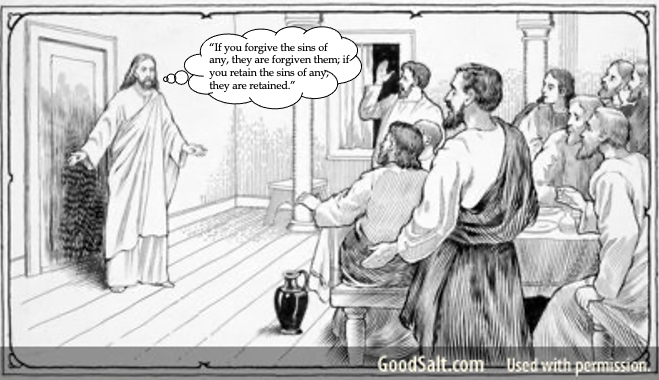“If you forgive the sins of any, they are forgiven them; if you retain the sins of any, they are retained.” John 20:23
Since coming to faith in Jesus in 1979, the Lord has enabled me to share the gospel of Christ with many people. For the past ten years, God has also given me the opportunity to train believers in evangelism and discipleship. I have found that it is very normal to experience fear when sharing the gospel with non-Christians. The goal is not to not have fear in evangelism, but to overcome that fear with God’s boldness.
The Lord has taught me that one of the reasons Christians experience fear in evangelism is that they do not know what to say to an unsaved person. So the obvious solution is to teach fearful believers what to say to a non-believer. This leads us to our next verse about overcoming our fears.
We are learning how to overcome our fears by looking at how Jesus enabled His disciples to overcome their fears when He encountered them the evening of His resurrection day hiding behind locked doors for fear of the Jews.From this encounter we have learned to overcome our fears when we …
– Rely on Jesus to calm our fear with His peace-giving presence (John 20:19).
– Redirect our focus to the evidence of Jesus’ resurrection to convince our doubting hearts (John 20:20).
– Renew our sense of purpose (John 20:21).
– Relate to the Person of the Holy Spirit (John 20:22).
After breathing the Holy Spirit upon His ten disciples to prepare them physically and visually for the coming of the Holy Spirit fifty days later on the Day of Pentecost in Jerusalem (John 20:22; cf. Acts 2:1-21; 11:15-16), Jesus then says to them, “If you forgive the sins of any, they are forgiven them; if you retain the sins of any, they are retained.” (John 20:23).
What does this verse mean? Is Jesus giving His disciples the ability to forgive and retain sins? Does this verse provide the biblical basis for Roman Catholic priests to forgive the sins of their parishioners?
To properly understand this verse, it is important to know that the Bible teaches that God is the only One who has the power and authority to forgive sins committed against Him. The Lord God said, “I, even I, am He who blots out your transgressions for My own sake; and I will not remember your sins.” (Isaiah 43:25). Mark 2:7 points out that only God can forgive sins. “Why does this Man speak blasphemies like this? Who can forgive sins but God alone?” Jesus demonstrated that He was God when He demonstrated the divine authority to both forgive the paralytic’s sins (an invisible healing) and enable him to walk (a visible healing). Jesus said to the scribes who thought He committed blasphemy by claiming to forgive sins, “ ’But that you may know that the Son of Man has power on earth to forgive sins’—He said to the paralytic, ‘I say to you, arise, take up your bed, and go to your house.’ Immediately he arose, took up the bed, and went out in the presence of them all, so that all were amazed and glorified God, saying, ‘We never saw anything like this!’ ” (Mark 2:10-12).
When we look at the Greek grammar of John 20:23, we learn that the first verbs in the two clauses (“forgive” and “retain”)are an aorist (aphēte) and present tense (kratēte), whereas the second verbs in each clause (“are forgiven” and “are retained”) are perfect tense verbs in the passive voice (apheōntai, kekratēntai). “The perfect tense portrays past action and affirms an existing result.” 1 This implies that the abiding state of the second verbs in each clause began before the action of the first verbs.
The passive voice indicates that someone has already done the forgiving or retaining. That Person must be God, since He alone has the authority to do that (Matt. 9:2-3; Mark 2:7; Luke 5:21). 2 This means that God’s action of forgiveness (“they are forgiven them”) took place prior to the announcement of forgiveness by Jesus’ disciples (“If you forgive the sins of any”). It also means that God’s action of withholding forgiveness (“they are retained”) also took place prior to the announcement of the withholding of forgiveness by Christ’s disciples (“If you retain the sins of any”). “The grammar used by Jesus did not provide the disciples with the personal authority to forgive sin.” 3
Robertson states, “What he commits to the disciples and to us is the power and privilege of giving assurance of the forgiveness of sins by God by correctly announcing the terms of forgiveness. There is no proof that he actually transferred to the apostles or their successors the power in and of themselves to forgive sins.” 4
God does not forgive peoples’ sins because we decide to do so nor does He withhold forgiveness because we will not grant it. We simply announce the previous forgiveness of God. We don’t create it. God has given Christians the privilege of proclaiming His terms on how a person can receive forgiveness of sins.
The basis for forgiveness is not that God likes us or even that He loves us. It is that Christ laid down His life to pay the penalty for all our sins. “The Son of His love, in whom we have redemption through His blood, the forgiveness of sins.” (Colossians 1:13b-14). Forgiveness is based upon the cross of Christ, not our performance or good works.
Some people think forgiveness is like a man saying to the child down the block who threw a baseball through his window. “It is okay kid. I like you. Forget it.” No, God is love, but He is also righteous and just. Biblical forgiveness is like a child throwing a baseball through a window and the owner’s son paying for the broken glass. Then the man says, “It is okay. My son paid for it.”
What God wants Christians to proclaim to people is that they can obtain His complete forgiveness freely by believing in Jesus Christ. The apostle Peter told a Gentile named Cornelius, “All the prophets testify about Him that everyone who believes in Him receives forgiveness of sins through His name.” (Acts 10:43 NIV).
What this means is when we share the gospel of Jesus Christ with the unsaved, which includes His death and resurrection (I Corinthians 15:3-6), we can say to them, “If you believe or trust in Christ alone, I can say on the authority of the New Testament, that you are forgiven.” Or we can say, “You are entitled to your opinion, but I must warn you that according to the New Testament, unless you believe or trust in Christ alone, your sin remains unforgiven.” The Holy Spirit enables us to authoritatively declare that God has indeed forgiven the sins of any who believe in Jesus Christ. 5
Jesus did something similar when He said to the Pharisees who overheard Christ’s conversation with the former blind man, “If you were blind, you would have no sin; but now you say, ‘We see.’ Therefore your sin remains.” (John 9:41). Christ is saying to these self-righteous religious leaders, “If you recognized your spiritual blindness and acknowledged your sin and guilt, you would have believed in Me for forgiveness. And I would have forgiven you so ‘you would have no sin.’ But because you claim to have spiritual sight and deny your own sin, and refuse to come to Me for forgiveness, ‘your sin remains.’ ”
Now Jesus’ disciples (including you and me) would continue His ministry relative to the forgiveness of sins. When we share the gospel, care must be taken to make sure they understand that only God forgives. But the messenger does state it. What a high privilege we have in announcing the forgiveness of sins to those who believe in Jesus Christ alone.
This leads to our final principle for overcoming our fears. REVIEW CHRIST’S MESSAGE OF FORGIVENESS AS YOU PROCLAIM THE GOSPEL TO THE LOST (John 20:23). If you are afraid to share the gospel with the unsaved because you are not sure what to say, review the message of the gospel with another Christian before going out to share with non-believers. You can role play with that believer. Have the other person assume the role of the non-Christians while you assume the role of the Christian and share the gospel with him or her. And remember, the gospel by which we are saved is that Christ died for our sins and rose from the dead (I Corinthians 15:3-6). Then invite the non-Christian to believe in Jesus for the forgiveness of all his or her sins (Acts 10:43).
When we share the good news of God’s forgiveness with non-believers, we not only bless those who hear the message, but we are also blessed to be reminded of the unlimited forgiveness we have in Christ. One of the greatest blessings we can receive is the joy of knowing that all our sins are forgiven through Jesus Christ! Every time we share the gospel with a lost person, we are blessed to review this incredible truth. Any doubts or fears we may have about being totally forgiven are quickly dispelled as we proclaim God’s free and unlimited forgiveness through Jesus Christ to a lost world.
But it is also true that one of the greatest fears a person can have is knowing your sins are not forgiven before you face a holy God. This is one of the main reasons why people are afraid of dying. They are not prepared to face their Maker without the forgiveness of Jesus Christ.
As we saw earlier, the Lord God said, “I, even I, am He who blots out your transgressions for My own sake; and I will not remember your sins.” (Isaiah 43:25; cf. Hebrews 10:16-18). God chooses to remember our sins no more when He forgives us.
If you are a Christian and you know God has forgiven you, but you are struggling to forgive yourself, listen to what Larry Moyer says about such a dilemma. “This is a beautiful way to explain God’s forgiveness: if what we have done is no longer on His mind, it doesn’t have to be on ours either.” 6
The more we focus on Christ’s forgiveness of all our sins, the less fear we will have about our future and the more joy we will have today.
Prayer: Lord Jesus, thank You so much for entrusting us with Your gospel message. Even though we are often afraid before sharing this life-giving message with the unsaved, we are also excited to watch what You will do in the listeners’ hearts. What a high privilege You have given us in announcing the forgiveness of sins to those who believe in You, and Your death and resurrection. Please provide other Christians we can practice sharing the gospel with to overcome our fears of not knowing what to say to a non-Christian. We are realizing that the more we share the gospel with the unsaved, the more we are reminded of the complete forgiveness we received the moment we believed in Jesus. Please let Your forgiveness ring throughout our communities and world. In Your mighty name I pray, Lord Jesus. Amen.
ENDNOTES:
1. J. Carl Laney, Moody Gospel John Commentary (Chicago: Moody Press, 1992), pg. 367 cites H.E. Dana and Julius Mantey, A Manual Grammar of the Greek New Testament (New York: Macmillan, 1927), pp. 200-201.
2. Tom Constable, Notes on John (2017 Edition), pg. 380.
3. Laney, pg. 367 cites Julius R. Mantey, “Evidence That the Perfect Tense in John 20:23 and Matthew 16:19 Is Mistranslated,” JETS 16 (1973): 129-138.
4. Archibald Thomas, A. T. Robertson’s Word Pictures in the New Testament (with Bible and Strongs Numbers Added!), 6 Volumes (The Ephesians Four Group: 2014 Kindle Edition), Kindle Locations 77918-77920.
5. Tony Evans, CSB Bibles by Holman. The Tony Evans Bible Commentary (B & H Publishing Group, Kindle Edition, 2019), pg. 1829.
6. R. Larry Moyer, Show Me How to Illustrate Evangelistic Sermons (Grand Rapids: Kregel Publications, 2012), pg. 288.












